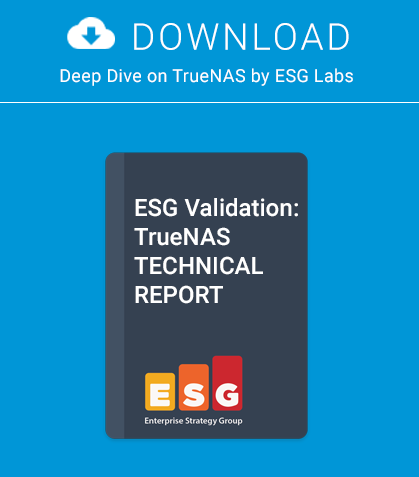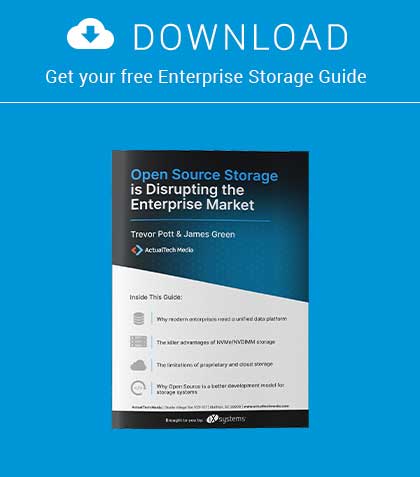By the time you’re reading this, FreeNAS has been downloaded more than 7.5 million times. For home users, it’s become an indispensable part of their daily lives, akin to the DVR. Meanwhile, all over the world , thousands of businesses, universities, and government departments use FreeNAS to build effective storage solutions in myriad applications. The FreeNAS Operating system is freely available to the public, offers thorough documentation, an active community and a feature-rich platform for the storage environment. Based on FreeBSD, FreeNAS offers sharing over a host of protocols (SMB, CIFS, AFP, NFS, FTP, iSCSI, etc), an intuitive, feature-rich Web Interface, the ZFS file system, a plug-in system for applications and much more.
What you will learn…
- How the TrueNAS builds off the strong points of the FreeBSD and FreeNAS operating systems
- How TrueNAS meets modern storage challenges for the Enterprise
What you should know…
- Basic understanding of Server technology
- Some networking knowledge
- Some knowledge of BSD Operating Systems
Despite the massive popularity of FreeNAS, most people aren’t aware of its big brother, dutifully storing and protecting data in some of the most demanding enterprise business environments: the proven, enterprise-ready, and professionally-supported line of appliances known as TrueNAS.
But, what makes TrueNAS different than FreeNAS? Well, I’m glad you asked…
Commercial Grade Support
When a mission critical storage system goes down, an organization’s whole operation can come to a screeching halt. While community-based support is wonderful (and free), it can’t always get an ailing storage server back up and running in a timely manner. Businesses need the responsiveness and expertise that only a professional, dedicated support team can provide. TrueNAS storage appliances provide that safety net.
Spawned by the same technical team at iXsystems that developed FreeNAS v8 for the home user, TrueNAS was created to provide a “FreeNAS for the Enterprise Business”, complete with around-the-clock support from that very same team. For customers, a support team with direct insight into the base operating system is crucial, saving wasted hours spent investigating possible known issues or configuration missteps. With decades of combined experience in both FreeBSD and enterprise storage software, the TrueNAS Support Team at iXsystems know the ins and outs of configuring storage in virtually any environment, while also possessing intimate knowledge of the underlying operating system.
The production environment is the heartbeat of every organization, designed to serve customers and employees around the clock. TrueNAS appliances help organizations achieve this goal. With software support available 24×7, service models with guaranteed response times, and a web-based support system, TrueNAS covers all the bases. But, the advantages don’t stop there.
Enterprise Features
FreeNAS is designed as a storage solution for any environment and is used in a wide variety of institutions and organizations. For the enterprise user, though, not having experienced UNIX or FreeBSD administrators on hand can provide some challenges. TrueNAS does the work to provide additional enterprise features in a qualified storage appliance:
- High Availability (Active/Passive) aka “failover”
- Automated Storage Tiering through right-sized flash-based read/write cache
- Robust, purpose-built hardware platform
- Enhanced Enclosure Management
- Automated drive swapping and “hot sparing” capability
- Built-in remote management
- Tuned for 10Gb Ethernet performance (up to 40GbE)
- ZFS tuning for enhanced storage performance
- Mirrored boot device support
- /swap on flash-based boot device instead of on pool components
- Integrated Support Module
- Enhanced graphical Reporting Module
- (coming soon) Qualified for VMWare, Citrix Xen, and Hyper-V
With its purpose-built hardware platform, TrueNAS’ leverages enclosure management through the integration of SCSI Enclosure Services (SES), which allows a technician to quickly and easily identify which drive in the hardware enclosure is failing. Having a hard drive fail without this can be the source of a maintenance confusion and frustration. While integrating this feature into FreeNAS isn’t easily done due to the need for multi-platform-compatibility, TrueNAS makes swapping a hard drive a straightforward operation.
One serious point of failure in standard storage configurations is when that if a head unit goes down, all of the storage becomes inaccessible. This can result in serious disruptions in day to day operations, costing time and money. TrueNAS offers protection with it’s High Availbility feature with Active/Passive Failover, giving organizations a way of avoiding downtime with dual-node head units. Along with the greater fault-tolerance and robust hardware platform, TrueNAS appliances bring several other features and performance enhancement to the enterprise data center: built-in remote management, storage tiering through integrated high-performance flash-based read and write cache, mirrored boot devices, NFS support, as well as 10GbE and ZFS performance enhancements. TrueNAS also comes with all the features that FreeNAS already provides, and is based on the FreeBSD operating system, which is renowned for its stability and security.
Secure, Robust Storage with the ZFS file system
When it comes to modern file systems, none are more flexible and powerful than ZFS, the file system at the heart of both TrueNAS and FreeNAS. Originally developed by Sun MicroSystems, ZFS was forged around the major tenets of storage: data integrity, security, flexibility, and scalability. With multiple data integrity checks, ZFS is structured so that each block of data has independent checksums. The filesystem utilizes this Copy on Write (CoW) transactional model to organize these blocks in a tree system where each block contains its “children’s” checksums, creating a self-validating storage pool from the top down.
ZFS also comes with powerful performance-enhancing features. First, it supports read and write caching, which allows for tiered hybrid storage. This means that the system can utilize high performance SAS and SSD drives (or other flash-based storage) in conjunction with high capacity storage drives to optimize storage pool performance. Most workloads can leverage the performance benefits of storage tiering, though tests have shown up to an 8x to 23x performance increase under certain workloads than without the cache:
As part of the hybrid and tiered storage feature, ZFS increases performance through its Most Frequently Used (MFU) and Most Recently Used (MRU) caching algorithms, which categorize data by date and usage, allowing prioritization of the system’s resources. Active data will be first in the queue for RAM and caching devices, minimizing the need to access slower spinning disks.
Qualified Bill of Materials, Tested Features
TrueNAS software is specifically designed around its own hardware platform, which allows for tightly-integrated and platform-specific functionality that cannot perform on disparate hardware. The TrueNAS hardware platform is the also the team’s development platform for both TrueNAS and FreeNAS software, which meansthe team at iXsystems rigorously tests every TrueNAS appliance to make sure both hardware and software function in harmony. Users get the convenience of a full-fledged appliance that saves them from the trial and error process of assembling one from scratch.
Since the system operates on professionally qualified hardware, it’s easier to pinpoint the source of any issues that may arise. Any bug fixes and issue escalations are brought directly to the TrueNAS team. This open line of communication also gives the user the power to influence the development roadmap. Today’s bugfix is tomorrow’s patch!
Based on Open Standards
TrueNAS is an enhanced version of FreeNAS and is ultimately based on FreeBSD. This means that FreeNAS runs on open standards and provides the user with benefits over closed, proprietary alternatives. Both the FreeNAS and FreeBSD projects have active communities, large user bases, and thorough documentation. By extension, TrueNAS users enjoy these benefits as well. There are thousands of people downloading the newest versions of FreeNAS every day and testing out its features on a daily basis. This ensures that only mature, tested features are rolled into TrueNAS’s codebase. As FreeBSD and FreeNAS improve and evolve, so does TrueNAS.
A Complete Unified Storage Offering for the Enterprise
All of these factors converge to make TrueNAS an integrated hardware and software solution that is all at once reliable, powerful, and highly scalable. Through utilizing hybrid storage with tiered caching, TrueNAS outstrips standard spinning disk storage configuration performance by orders of magnitude. The intuitive web interface puts powerful tools at the user’s fingertips for a wide range of storage functionality. TrueNAS takes the guesswork out of storage and comes supported by the team of professionals that brings the world FreeNAS, providing a complete unified storage solution for the enterprise environment that you can rely on. If you are wanting to utilize FreeNAS in the Enterprise, TrueNAS delivers a time-tested product backed by a team of top-notch BSD Developers. Whether it’s for primary, secondary storage, FreeNAS’s robust feature set combine with proven hardware configurations to meet the needs of businesses and organizations with TrueNAS. And now you know.
Bios
Mark VonFange is the Professional Services Manager at iXsystems, providing oversight and coordination of its FreeBSD, PC-BSD, and FreeNAS support and development services. The Professional Services Team provides services ranging from mission critical support to software and firmware development to private consultation. Mark also develops internal and external documentation for division sales and marketing.
Annie Zhang performs a variety of duties for the marketing department at iXsystems. She started using open source software during her sophomore year at Wellesley College. Since then, she has increasingly relied on Open Source products; she appreciates the security, flexibility, interoperability, and of course, price.



